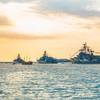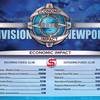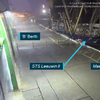US, China Officials Meet After Navy Jet Intercept
U.S. and Chinese military officials will hold talks on rules of behavior at the Pentagon on Tuesday and Wednesday, a U.S. official said, days after the United States denounced a "dangerous" Chinese jet intercept of a U.S. Navy patrol plane.
Last Tuesday, a Chinese fighter pilot flew acrobatic maneuvers around the U.S. Navy's P-8 Poseidon antisubmarine and reconnaissance plane, crossing over and under it in international airspace over the South China Sea, the Pentagon said.
At one point, the jet flew wingtip-to-wingtip about 10 yards (9 meters) from the Poseidon, then performed a barrel roll over the top of it. The U.S. defense official said other close intercepts occurred in March, April and May.
While this week's discussions at the Pentagon were planned long before the recent incidents, they touch on issues at the core of the U.S. concerns about Chinese military behavior: that a Chinese provocation could spiral into a broader crisis sparked by a military miscalculation in the disputed territory.
China's sovereignty claims over the strategic stretch of mineral-rich water off its southern coast and to the east of mainland Southeast Asia set it directly against U.S. allies Vietnam and the Philippines, while Brunei, Taiwan and Malaysia also lay claim to parts of the disputed areas.
The meetings involve a working group to discuss existing multilateral standards of behavior for air and maritime activities, the defense official told Reuters, speaking on condition of anonymity.
Rear Admiral James Foggo, Assistant Deputy Chief of U.S. Naval Operations, is among the U.S. military officials attending, the official said.
China's Defence Ministry confirmed it had sent a delegation to the United States for the "consultative working group meetings" but it did not say which officials were involved.
"This is a program within the Sino-US annual exchange plans, and is aimed at implementing the relevant consensus achieved by the leaders of the two countries and to promote the establishment of the code of conduct on naval and air force safety on the high seas between China and the United States," the ministry said in a faxed statement to Reuters.
The U.S. and Chinese militaries have boosted their contacts in recent years amid recognition that, as China's economic interests expand, it will play a bigger security role in the world and have more interactions with the U.S. military.
Still, the recent intercepts show that those increased contacts have not eliminated friction.
In April 2001, a similar aggressive intercept of a U.S. EP-3E spy plane by a Chinese F-8 fighter in the same area resulted in a collision that killed the Chinese pilot and forced the American plane to make an emergency landing at a base on China's Hainan island.
The 24 U.S. air crew members were held for 11 days until Washington apologized for the incident. That encounter soured U.S.-Chinese relations in the early days of President George W. Bush's first administration.
China has denied wrongdoing in the latest incident and blamed the United States, citing "large-scale and highly frequent close-in reconnaissance."
State Department spokeswoman Jen Psaki responded by saying the United States operated "in a transparent manner."
"We make other countries, including China, aware of our plans," Psaki said.
(By Phil Stewart and David Brunnstrom, Additional reporting by Sui-Lee Wee in BEIJING; Editing by Robert Birsel)















